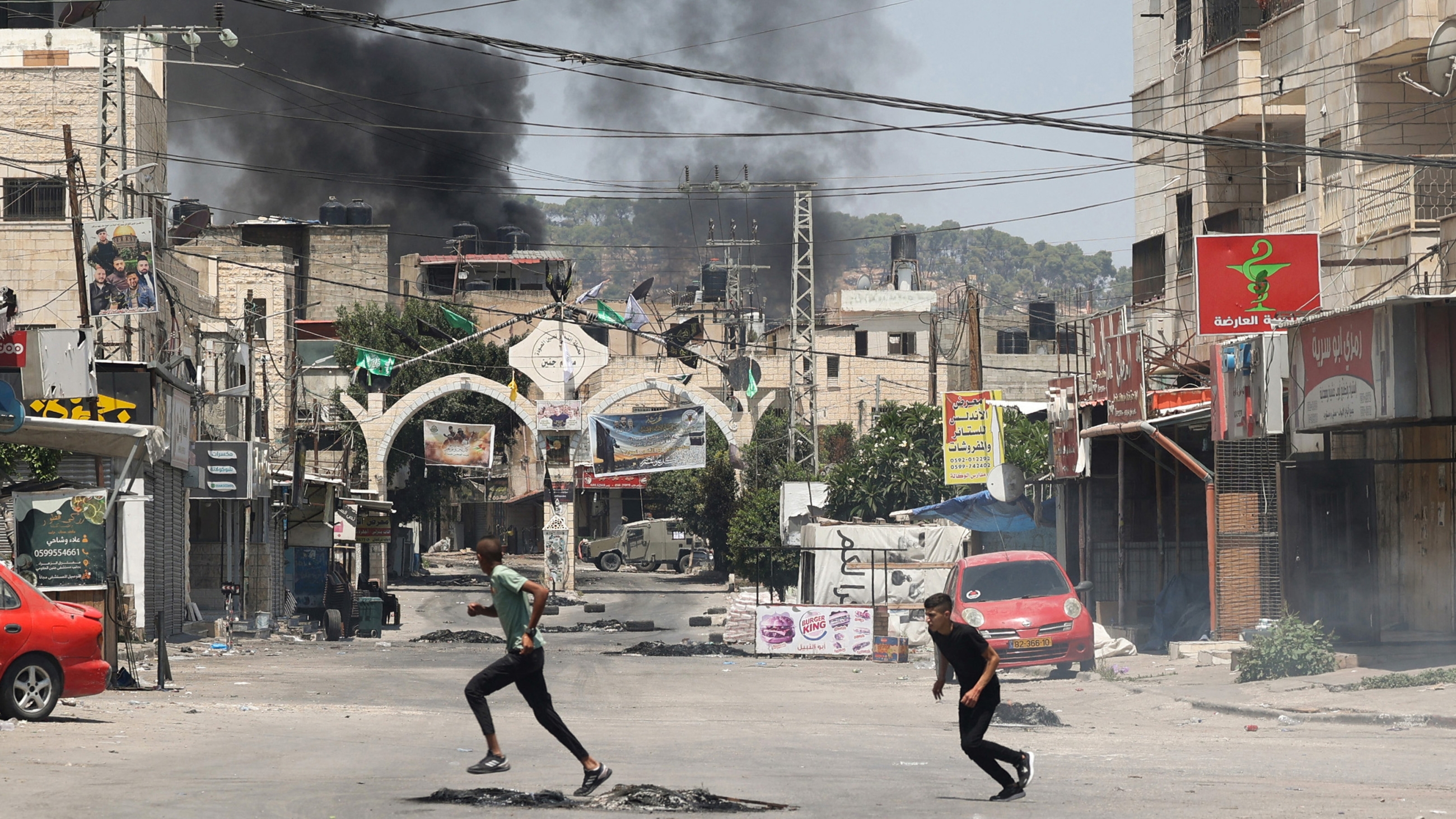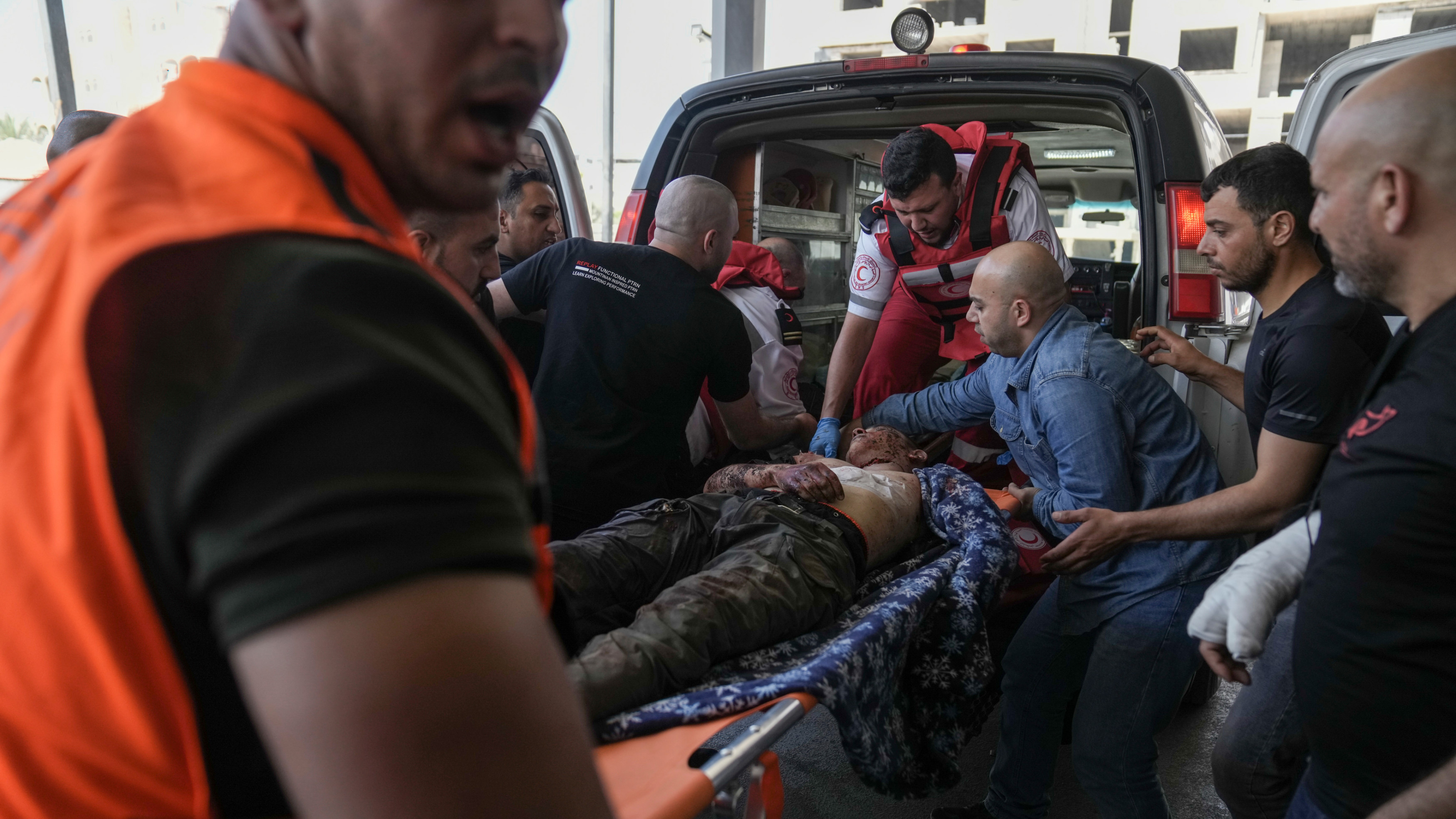Jenin: Eight Palestinians killed as Israel bombs West Bank city in large offensive

Thousands of Palestinian civilians were streaming out of Jenin in the occupied West Bank late on Monday night local time as the refugee camp braced for a new night of assaults, with Israeli military reinforcements reportedly streaming to the city.
Israeli drones and Apache attack helicopters in coordination with ground forces attacked Jenin on Monday morning.
At least eight Palestinians were killed, including three children, and 50 wounded, according to the Palestinian health ministry.
Four were killed from gunshot wounds and at least three died in air strikes.
The ministry said the number of casualties was likely to rise because there is a high number of critical injuries and because Israeli army bulldozers were blocking paramedics from reaching some areas.
Stay informed with MEE's newsletters
Sign up to get the latest alerts, insights and analysis, starting with Turkey Unpacked
An official at the Jenin Government Hospital said the attack was one of the worst in years, adding: "We have not received this number of serious injuries since 2002."
The attack prompted condemnation from the Arab and Muslim-majority world with Egypt, Turkey and the United Arab Emirates all criticising Israel's actions.
Lynn Hastings, the UN humanitarian coordinator in Palestine, said she was "alarmed by the scale of Israeli forces' operation" in Jenin.
"Air strikes were used in the densely populated refugee camp. Several dead and critically wounded. Access to all injured must be ensured," she said on Twitter.
Later in the day, a UN spokesperson told reporters that “it is not acceptable for there to be armed attacks in areas of high population density" when asked about the drone strikes.
A local resident told Middle East Eye that the buildings shelled belonged to civilians, and included the Freedom Theatre, a popular cultural centre in the city.
Mahmoud al-Saadi, director of the Palestinian Red Crescent in Jenin, told AFP there was “bombing from the air and an invasion from the ground."
"Several houses and sites have been bombed.... smoke is rising from everywhere."
Hafeth Abu Sabra, an eyewitness from Jenin refugee camp, described scenes of horror in the city's street.
He said Israeli forces were destroying infrastructure and public property as snipers were stationed inside armoured vehicles and on rooftops, firing live rounds at unarmed Palestinians standing near the camp's entrance.
"Two civilians were directly hit in front me," Abu Sabra told MEE as the sound of sniper gunshots were heard in the background during the interview.
He said one of them was seriously wounded after a sniper struck him in the head and he likely died on his way to hospital, although Palestinian health officials have not confirmed the death.
"He just stood and wasn't doing anything. He was not armed and wasn't even throwing rocks at the armoured vehicles," Abu Sabra said.
He added that the camp's entrances and alleyways are besieged from every direction, making movement very difficult for civilians stuck inside.
Al-Amal Hospital in Jenin was targeted during the Israeli offensive, with videos shared online showing the hospital's shattered windows, an apparent result of gunfire. The military also stormed Jenin's Al-Ansar Mosque after claiming that armed men were holed up inside it.
Paramedics trying to reach some neighbourhoods were targeted with Israeli fire, the Palestinian Red Crescent Society said.
Journalists with the Al Araby TV channel also came under fire, leaving some of their equipment damaged.
Israeli Prime Minister Benjamin Netanyahu praised security ties with the US and American backing for a deadly attack, saying it demonstrated that "security cooperation [with the US] has never been better".
Translation: The moment Al Araby TV team was targeted and shots were fired at the camera and the live broadcast device while it was covering the storming of Jenin
1,000 troops
Earlier in the morning, the Israeli military said in a statement it was conducting a "focused" and "extensive counterterrorism effort" in the Jenin area.
A military source said more than 1,000 soldiers are involved in the operation from various departments, including members of the army and the air force, according to Israeli news website Walla.
The Jenin Brigades, the most prominent armed group in the city established in 2021, said in a statement it was responding with a counter operation aimed at stopping the Israeli advance.
Heavy armed clashes and large blasts were heard throughout Jenin, including in the refugee camp, as Israeli troops encircled the area.
Translation: The moment an explosive detonated targeting an Israeli army bulldozer.
Several explosive devices planted by Palestinians were detonated, likely targeting Israeli army vehicles. At least one soldier was wounded from grenade shrapnel, according to the military.
Local media said Israeli armoured bulldozers were advancing towards the Jenin refugee camp, tearing apart streets to clear them of potential bombs planted on roadsides. Some Israeli tanks were spotted on the outskirts of Jenin.
Unarmed civilians in Jenin also took to the streets to confront Israeli troops, burning tyres and throwing rocks at army vehicles.
An MEE correspondent in Jenin said current scenes are reminiscent of the 2002 Israeli invasion of the city at the height of the Second Intifada, which killed dozens of Palestinians and left wide-scale destruction.
Palestinian factions condemned the operation on Monday and said Israel bears the responsibility for the escalation.
The Palestinian Joint Command, an umbrella body of armed factions in Gaza, released a statement saying the Palestinian resistance "everywhere" will "not allow" Israel to isolate Jenin in its aggression.
"The nature of the Palestinian resistance's response will be determined by the conduct of the occupation and the scale of the operation," it said in a statement.
According to the Israeli army radio, the military has deployed Iron Dome batteries in preparation for possible rockets from Gaza or Lebanon.
'New war crime'
Palestinian presidential spokesperson Nabil Abu Rudeineh said in a statement that Israel was committing a "new war crime against our defenceless people."
Jenin's deputy governor, Kamal Abu El-Rub, said Palestinians are the rightful owners of the land and therefore have the right to defend themselves against Israeli aggression.
"The will of the Palestinian people will always be bigger than the crimes of the Israeli occupation," Abu El-Rub told MEE.
Commenting on the operation, Israeli Defence Minister Yoav Gallant said: "We will take an offensive approach against terrorism. Anyone who harms the citizens of Israel will pay a heavy price."
For the past two years, Israel has increased deadly raids on Jenin, killing more than 100 Palestinians from the northern West Bank city since 2022.
The latest raid two weeks ago killed at least six people but faced fierce Palestinian resistance, forcing the military to deploy Apache attack helicopters to evacuate army vehicles stuck for hours in an ambush set by local fighters.
Two days later, an Israeli drone killed three Palestinians near Jenin, in the first aerial attack in the occupied West Bank in nearly 20 years.
The Jenin camp, which lies at the heart of the city, is half a square kilometre in size and home to some 13,000 refugees.
In 2002, Israel launched a 10-day military campaign in the city that killed at least 52 Palestinians and laid waste to its camp, destroying hundreds of civilian homes and displacing thousands.
Tariq Zaid, a journalist from Jenin, said while the scale of today's operation is the biggest since then, the situation is slightly different than it was during the Second Intifada.
"In 2002, Israel knew that invading would lead to the collapse of the PA, and at the time it wanted to eliminate the PA because it considered that Yasser Arafat was part of the resistance," he told MEE.
Nowadays, however, Israel is not interested in the collapse of the PA.
Zaid added that Palestinian resistance in Gaza and Lebanon must also be part of the Israeli calculations when determining the scale of attacks in Jenin.
"This [Israeli] government wants to get rid of Palestinians, but they can’t just do what they want as there is the consideration of the resistance in Gaza, which would make them think hard before taking a step that might incite that front."
Additional reporting by Lubna Masarwa in Jerusalem.
This article is available in French on Middle East Eye French edition.
Middle East Eye delivers independent and unrivalled coverage and analysis of the Middle East, North Africa and beyond. To learn more about republishing this content and the associated fees, please fill out this form. More about MEE can be found here.






